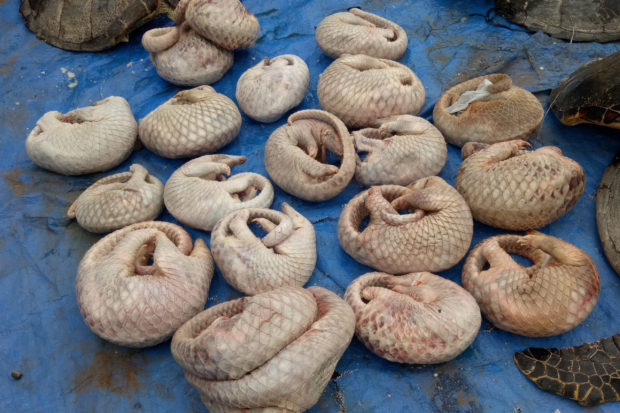
IN DEMAND Philippine pangolins—like this batch confiscated from a wildlife trafficker in Palawan in July 2018—have been found kept in residential subdivisions in Metro Manila where Chinese Pogo workers are known to stay, according to the Traffic report. —PHOTO COURTESY OF TRAFFIC
MANILA, Philippines — Nearly 7,000 Philippine pangolins (Manis culionensis) were seized in various areas nationwide between 2018 and 2019, marking a ninefold increase in the numbers compared to the period 2000-2017, according to a new study on the illegal pangolin trade in the country.
The stunningly high figures are recorded in the study by the wildlife monitoring network Traffic and can be attributed to the increased demand for pangolin meat and scales. The demand is primarily driven by the influx of foreign workers, mainly Chinese nationals employed in Philippine offshore gaming operators or Pogos.
The study, titled “Endangered by Trade” and published on Monday, presents yet another grim reality for the Philippine pangolin, one of the eight pangolin species. These shy, nocturnal and elusive animals found in Asia and Africa are widely considered the most trafficked mammals in the world.
Among the eight species, the Philippine pangolin locally known as “balintong” has the most restricted range and can only be found in the jungles of Palawan province.
Because of their fast-dwindling numbers, Philippine pangolins were classified as critically endangered by the International Union for Conservation of Nature last December.
Largest seizure ever
The Traffic report states that over 90 percent of Philippine pangolins intercepted in the illegal trade in the last two decades were seized in just the last two years of the observation period.
Records show that between 2000 and 2017, an estimated equivalent of 740 Philippine pangolins were seized from the illegal trade. But between 2018 and 2019, an estimated 6,894 pangolins were seized, including 1,154 kilograms of scales discovered in a warehouse in Palawan’s capital city of Puerto Princesa—the largest seizure ever recorded in the country.
The scales, valued up to P46 million, came from at least 3,900 killed Philippine pangolins, according to Emerson Sy, one of the report’s authors.
The traffic in pangolins is mainly driven by the belief—largely unsubstantiated—that their scales have medicinal purposes.
“There really has been an increased demand, especially with the foreign workers that are here in the Philippines, or foreign tourists who really come to specifically consume wild meat,” Sy said in an interview with the Inquirer.
The report notes the series of unusual rescues (called “retrievals”), in which individual live pangolins were found wandering the streets in Metro Manila, some 600 kilometers away from their natural habitat in Palawan.
Sy said some of these pangolins had been caught in residential subdivisions in the cities of Pasay, Parañaque and Manila, where Chinese nationals working in Pogos are known to stay.
Restaurants, traditional meds
Also highlighted in Traffic’s report is the presence of restaurants serving dishes made with pangolin meat.
“Conversations with contacts and restaurant workers pointed to mainland Chinese nationals who are looking to consume wild meat and reportedly willing to pay the high asking price as the primary consumer of pangolins in the Philippines,” the report states.
Off the menu and prepared on a preorder basis, these exotic dishes command exorbitant prices ranging from P30,000 to P40,000 per stew.
The study also documents traditional Chinese medicine stores in Manila offering pills claiming to contain pangolin derivatives.
Slap on the wrist
Lack of investigations, few successful arrests and prosecutions, and low penalties remain the greatest challenges to efforts to curb pangolin trafficking in the country, according to the report’s authors.
For example, the first conviction of pangolin traffickers outside Palawan took place only in July 2019, when a court in Cavite province sentenced three traffickers for illegally transporting 10 pangolins. But the convicts were simply slapped on the wrist with jail time of up to three months and a fine of P20,000 each.
Of the 10 trafficked pangolins, only three survived and were returned to Palawan.
Sy said Philippine courts should have a deeper appreciation and understanding of the impacts of wildlife crime.
“[To] use an analogy, the Philippine pangolin is like the Philippine eagle [among] birds. That’s its level,” he said. “Unfortunately, many do not appreciate the importance of the Philippine pangolin, not just ecologically but also as a national heritage.”
In order to curb pangolin trafficking and save what remains of the species, everyone—including the public—should come together to protect it, Sy said.
“By nature, the illegal wildlife trade is not only confined to one person. Many people know about it. They have to come forward and work with wildlife authorities to stop the illegal trade,” he said.